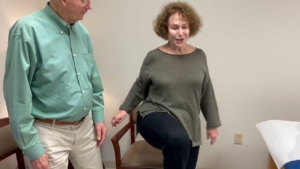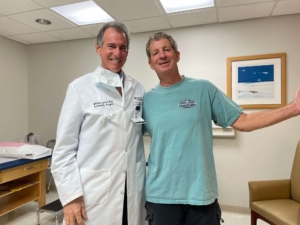What’s Your Hip Replacement IQ?
(Third of a three-part series)
This is the third of a three-part series that has been designed as a “quiz” to test your knowledge and hopefully give you new information and insight regarding total hip replacement. These are questions many patients have asked over the years. The responses after the questions have been designed to better prepare you before surgery so you can go into surgery safer and with more confidence. Also to help you better anticipate what to expect after your surgery. At the Leone Center, we repeatedly see that patients who go into surgery more prepared and more knowledgeable have a better experience and get well faster.
There are 6 TRUE or FALSE questions followed by expanded answers.
On our website (holycrossleonecenter.com) you can download our helpful booklet “Preparing For Your Hip Replacement” which is filled with step-by-step information.
We are a concierge practice with a personalized approach that begins with the first phone call and continues throughout your care. No crowded waiting rooms and rushed meetings with Dr. Leone or his entire team. We model our care according to the way we would want our own families to be treated and that means that only the best will do.
True or False?
- Most, or all your pain will go away in the weeks after surgery.
- A healthy diet with lots of fruits, vegetables and lean protein, plus vitamin C and iron supplements, can help the healing process after surgery.
- After hip replacement, most people can gradually resume gentle daily activities and walking, but never plan to do more vigorous activities such as pickleball, tennis or jogging.
- It is not unusual to need another replacement on your other hip in the years following your first hip replacement.
- Most artificial hips last 20 years or more before they begin to loosen.
- A concierge surgical practice refers to an exceptional level of personalized, attentive care provided by the surgeon and his/her entire team, combined with state-of-the-art, expertly performed surgery and care.
Answers:
(15-20) True, True, False, True, False, True

- MOSTLY TRUE: Most or all of your pain will go away in the weeks after surgery.
Replacing an arthritic hip immediately stops the bones that make up our hip joint from rubbing together by resurfacing the ends of the bones with artificial parts. Patients report dramatic and immediately relief because nerve endings in the bone are no longer being stimulated. The inflammation and swelling also resolve, but can take longer.
Frequently after a hip replacement, pain in other areas of a patient’s body, like the same side knee or lower back also improves or resolves completely, if the pain was being “referred” from the arthritic hip and/or because the body mechanics and fluidity of gait normalize after the hip replacement thereby taking stress off of these other joints.
- TRUE: A healthy diet with lots of fruits, vegetables, and lean protein, plus vitamin C and iron supplements, can help the healing process.
Dr. Leone strongly emphasizes to patients that being healthy and well-nourished is critical to the healing process. Many who are significantly overweight are actually malnourished, while those who are underweight can also be nutritionally compromised. Both types of patients have a much higher incidence of problems after a hip replacement surgery, including wound problems, infection, delay in discharge, and frequency of readmission. Our Orthopedic literature even reports an increased risk of mortality in the two years after their surgery which is not necessarily related to the hip replacement.
Therefore, knowing whether you are nutritionally compromised and eating healthy foods to improve and maintain your nutritional status prior to surgery is very important.
- FALSE: After a hip replacement, most people can resume gentle daily activities like walking, but under no circumstances should they ever do more vigorous activities such as pickleball, tennis or jogging.
Dr. Leone wants and encourages his patients to return to their full activities, but while using prudence and good judgement. Tennis, pickleball, dancing, Pilates and even light jogging is fine. Dr. Leone has cared for some folks who’ve returned to running marathons and even participating in Ironman competitions, which he teaches is excessive and does not recommend!
Dr. Leone tries to impart to patients that, while their new joint is an incredible gift and feat of modern technology that has relieved them of their pain and once again allowed them to become very active, it’s still a mechanical contraption. If they’re determined and work hard enough to destroy their new hip joint, they likely will.
The goal should be to find that balance after hip replacement where one can be wonderfully active to maintain their emotional and physical health by staying fully engaged with life, while not excessively abusing the new joint so it can last as long as possible.
Thus, he encourages patients to use their judgement.
“If your little voice is telling you it’s a bad idea, it probably is,” he says.
- TRUE: It is not unusual to need another replacement on your other hip in the years following your first hip replacement.
Patients often present to Dr. Leone complaining of pain with limitations in just one of their hips. Very frequently the arthritic condition causing these symptoms is also developing on the other side. Typically, the arthritic condition is more advanced on one side than the other. Some people who are experiencing symptoms bilaterally share that the pain or limitations which prompted the appointment are much more severe on one side than the other and that they can still ignore the other side. Others aren’t even aware that they are developing a problem with their other hip.
This is because the arthritis that develops in most hips which ultimately goes on to require a hip replacement is due to an underlying genetic condition. Many folks are born with a less than optimal relationship between their femoral head and acetabulum (socket) with leads to the “secondary” degenerative arthritis. More often than not, they were born with this condition bilaterally, although often one side is more severe. Environmental factors can also play a big role. For example, both hips may have been exposed to high-impact sports. Obesity, high-dose steroids, or alcohol can also cause problems effecting both hips.
When patients are in an early and more tolerable stage of arthritis in their other hip, Dr. Leone advises them to first replace their most symptomatic hip, to then let their bodies heal and get back to activities that they enjoy until they can’t, because of the other hip. Hopefully, the post-op exercises, possibly weight loss, and increased activity resulting after the most symptomatic hip is replaced, improve symptoms on their “other side”. Consider replacing their “other side” when symptoms become severe enough that they are again interfering with their life, their ability to be active, and when conservative nonoperative treatments aren’t cutting it.
The reality is that most folks will not wait as long to have a surgery on their other hip, because no one wants to live with pain and limits once they know how well they did with their first hip replacement.
Dr. Leone also sees a lot of people who have equally advanced and symptomatic arthritis in both of their hips. Even then, he first replaces the hip that is either most symptomatic or most deformed. In a staged planned process, he will replace their other hip often just two to six weeks after their first surgery. He does not advocate replacing both joints at once.
- MOSTLY TRUE: Most artificial hip joints last about 20 years or more before they begin to loosen.
With the type of modern materials now used to make artificial hip prostheses, particularly those implanted after the year 2000, it’s likely that prosthetic joints can function perfectly for more than 20 years. Modern total hip implants truly have a remarkable track record. When they do fail, it can be for a variety of reasons. Loosening of the prosthesis is just one of the reasons.
As the prosthetic hip joint moves over millions of cycles, the plastic liner wears releasing tiny plastic particles. These particles incite an inflammatory response resulting in discomfort and stimulate cells to destroy the bone that supports the prosthesis. This can lead to loosening.
After the millennium (2000), the plastic used to make the liners was vastly improved. Polyethylene molecules in the plastic are more extensively cross-linked and oxygen free radicals are removed. This highly crossed-linked polyethylene became the bearing of choice and was implanted much more widely. Studies have demonstrated that wear-rates are a magnitude (10 times) less when highly crossed-linked polyethylene is used compared to earlier generations of plastics and remains today the gold standard. This helps explain the improved longevity we are seeing in total hip replacements.
- TRUE: A concierge surgical practice refers to an exceptional level of personalized, attentive care provided by the surgeon and his or her entire team, combined with state-of-the-art, expertly performed surgery and care.
My entire team and I take great pride in referring to our practice as a “concierge practice”. The care we provide is gratifying for all of us, because we spend time with our patients educating and helping them through the process and watching them get well. Our emphasis is our quality, not quantity. In many ways, our practice is a paradox, sadly something which is becoming rare and rare. “Old fashion” people-oriented care, combined with absolute state-of-the-art technology and surgical skills.
The Leone Center for Orthopedic Care provides highly personalized, end-to-end orthopedic care for people with hip and knee conditions. Dr. William Leone offers patients the latest, most-promising innovations in joint replacement surgery, in a compassionate, patient-focused setting. He has performed over 15,000 joint surgeries over the course of his career, restoring mobility and improving quality of life for thousands of patients from all over the world.
The Leone Center for Orthopedic Care at Holy Cross Hospital is located at 1000 NE 56th Street in Fort Lauderdale. For more information or to schedule a consultation please call 954-489-4575 or visit holycrossleonecenter.com.
Check out Dr. Leone’s Patient Testimonials. These grateful patients make it all worthwhile.






